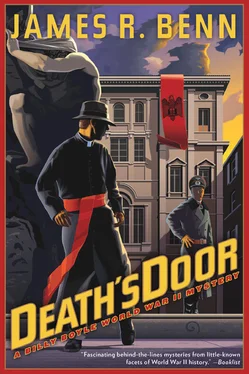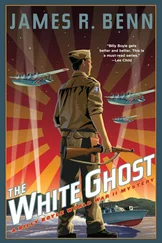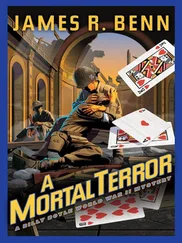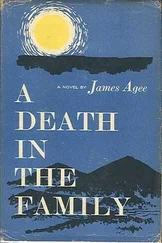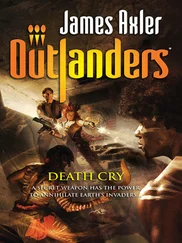James Benn - Death
Здесь есть возможность читать онлайн «James Benn - Death» весь текст электронной книги совершенно бесплатно (целиком полную версию без сокращений). В некоторых случаях можно слушать аудио, скачать через торрент в формате fb2 и присутствует краткое содержание. Жанр: Шпионский детектив, на английском языке. Описание произведения, (предисловие) а так же отзывы посетителей доступны на портале библиотеки ЛибКат.
- Название:Death
- Автор:
- Жанр:
- Год:неизвестен
- ISBN:нет данных
- Рейтинг книги:4 / 5. Голосов: 1
-
Избранное:Добавить в избранное
- Отзывы:
-
Ваша оценка:
- 80
- 1
- 2
- 3
- 4
- 5
Death: краткое содержание, описание и аннотация
Предлагаем к чтению аннотацию, описание, краткое содержание или предисловие (зависит от того, что написал сам автор книги «Death»). Если вы не нашли необходимую информацию о книге — напишите в комментариях, мы постараемся отыскать её.
Death — читать онлайн бесплатно полную книгу (весь текст) целиком
Ниже представлен текст книги, разбитый по страницам. Система сохранения места последней прочитанной страницы, позволяет с удобством читать онлайн бесплатно книгу «Death», без необходимости каждый раз заново искать на чём Вы остановились. Поставьте закладку, и сможете в любой момент перейти на страницу, на которой закончили чтение.
Интервал:
Закладка:
“A regular fortress you have here,” O’Flaherty said. “Any change in your guest?”
“I was able to give him some sips of broth earlier,” Nini said. “Sister Cecilia went to the kitchen and said I wasn’t feeling well, and brought the food up. No one suspects Severino is here, I am sure.”
“That’s right,” Kaz said. “It was quiet all night.”
“Good, good,” O’Flaherty said. “Well, collect your armament, Billy, and let’s be off. I’ve sent up my prayer to Saint Gabriel this morning, so I’ve done all I can.”
“Why Saint Gabriel?”
“He’s the patron saint of letter carriers, he is! Come on, have a cheer, my boy. Things will go well, you’ll see. But if things go awry, I’ll be nearby. The offices of Propaganda Fide are in the Piazza di Spagna, which is the square at the bottom of the steps. It’s Vatican territory, so if you need refuge, go there. Follow me when I get off the trolley and I’ll point it out.”
“Thanks for your help, Monsignor. And your prayers,” I said.
“We Irish have to stick together, don’t we? Now let’s be off. The sooner the better.”
“I wish I were going with you,” Kaz said, handing me the Beretta.
“Me too,” I said, pocketing the weapon. “Hold tight, okay?”
“We will be waiting,” Kaz said. “For all of you.”
We left through the Porta Angelica, near the barracks of the Swiss Guard, avoiding most of the German guards. O’Flaherty went first, bent over his bag, sorting his mail. I trailed him by a few steps, hands stuffed into my pockets, shoulders bunched against the cold, trying to look like another Italian out on business or coming from Mass. The key was not to look around, not to betray any of the nervousness I felt with one glance too many at the bored Wehrmacht guards or the plainclothes secret police hovering a few yards behind them.
O’Flaherty was a good actor. He was a convincing mailman, with a delivery around every corner. After twisting through a few side streets and confirming we weren’t being followed, we entered a main thoroughfare, the Via Cola di Rienzo. Traffic was light, mostly military. A trolley car rumbled down the road, and I joined a line at the stop, O’Flaherty right behind me. A hand on my shoulder, a wink to the conductor, and we were aboard.
We changed trolleys twice. From what I knew of Rome from the map I had studied, we were taking the long way around, across the Tiber and then up to the Quirinal Palace, where Mussolini and the king of Italy used to run things. Now Il Duce was up north, under the German thumb, and the king was down south, under Allied thumbs. Both were relics of history, pitiful jokes that history played on this poor, beautiful nation.
The trolley barreled downhill on the Via Sistina, picking up speed. The bell rang for a stop and O’Flaherty motioned for me to follow. On the street, a few shops were open, but only halfheartedly. No customers, not much food to sell. There was a line outside a bakery, and one jewelry store had so many watches in the window, I figured hungry shoppers must have sold them for bread. I kept O’Flaherty in view, which, considering the length of his stride, took some doing. As the street opened into a small piazza, he stopped at the base of an obelisk in the center of the square, adjusting the strap on his mailbag. I stopped and craned my neck, admiring the Virgin Mary standing at the top of the column.
“The building to your right,” he said in a low voice. “See the yellow-and-white flag? That’s Propaganda Fide. Where we plan our missionary work, although there is precious little of that these days.”
“Got it,” I whispered.
“Follow the piazza in the other direction. You’ll be at the base of the Spanish Steps. The church is at the top, to your right. Go gcuire Dia an t-adh ort.”
“I’ll wish you the same, Monsignor, but I’d say God’s already put his luck on you.”
He left me looking up to the Virgin Mary, trying to remember a prayer or two. I got my bearings: Propaganda Fide faced the square at the south end, guarded by Mary on her column. Three stories tall, beige stucco. I knew where I was.
Many of the windows along the way were shuttered tight. This winter of German occupation didn’t make for much of a tourist trade. I strolled along the piazza, which widened as I approached a fountain. The Spanish Steps ascended to my right, but I tried not to gawk. I had more than two hours before the meet, and I was here to watch for signs of a setup, not to sightsee.
A gaggle of German soldiers, apparently on leave, given their soft cloth caps and cameras hung around their necks, chatted and smoked cigarettes, tossing their butts into the empty fountain. From the northern end of the square I heard the distant sound of marching boots. The few civilians in the piazza all began to walk in a different direction, and I took the hint. I cut down the Via della Croce, and made a long loop around to arrive back at the square, in time to see the tail end of a formation of ten German soldiers leaving the piazza. I guessed that sergeants were alike in every army, and some Kraut felt the need for useless early-morning exercise.
I was heading in the direction of the Spanish Steps, so I ascended them, stopping midway as if I needed to catch my breath. It wasn’t hard to pretend. There were a helluva lot of steps. Below me I saw a mailman, but it wasn’t O’Flaherty. Above, a couple of workmen in blue coveralls were cleaning the steps, dragging their trashcans and emptying their sweepings into them as they went.
I took a few more slow steps and turned. It was hard not to admire the view. Saint Peter’s rose above the rooftops, the crosses and spires of lesser churches dotting the landscape. The morning clouds were breaking up, and shafts of sunlight fell on the city, reflecting off windows and giving the buildings a soft, golden glow. The wind was strong, so I turned my collar up and pulled down the fedora, glad to have a good reason to hide my features. It’s hard to spot a guy if you only have a photograph or have only seen him once, doubly hard if you can’t see his whole face.
I passed the church without a second glance, trying to look like a Roman late for a morning appointment. Next to the church was the Hotel Hassler, and the German-sounding name drew me on. What better place for Remke to stash his men, and perhaps prisoners, than in a nearby hotel. Of course the same thing went for the Gestapo. The place could be crawling with them.
I pushed open the polished brass door and felt the welcome warmth of the lobby. Marble floors and columns extended the length of the building. On either side, plush red velvet armchairs and couches were situated for those who wanted to see and be seen. I chose a chair in the corner, which gave me a view of the street and the lobby. I picked up a newspaper and leafed through it. The Italian was bewildering, but the pictures of Mussolini and Hitler were plentiful. I pretended to read, sweeping my gaze across the lobby and out the window, looking for anything out of the ordinary.
A line of monks shuffled down the street, probably heading for the church. A German Wehrmacht general made for the elevator with a beautiful dark-haired woman on his arm. Two aides grabbed chairs on the other side of the lobby and lit cigarettes. It didn’t take a detective to figure that one out. Street sweepers worked their way past my window, their brooms pushing litter from the gutters. They looked straight down, not side to side, which meant they were intent on their work. That alone made me suspicious. Sweeping the streets sounded like boring work. Why were these guys so focused? Overacting?
I was about to get up and check out the sweepers more closely when two heavyset thugs in trademark Gestapo black leather trench coats walked in from the street. I brought my newspaper back up to read, not wanting them to think I was leaving because of them. They heaved themselves into two nearby chairs, their Nazi Party badges prominently displayed on their lapels. They didn’t speak, but stared disdainfully at anyone who met their gaze. I studied pictures of Italian troops fighting with the Germans at Anzio, and words such as vittoria gave the impression that the brave Fascists where about to drive the Allies into the sea. Victory at last.
Читать дальшеИнтервал:
Закладка:
Похожие книги на «Death»
Представляем Вашему вниманию похожие книги на «Death» списком для выбора. Мы отобрали схожую по названию и смыслу литературу в надежде предоставить читателям больше вариантов отыскать новые, интересные, ещё непрочитанные произведения.
Обсуждение, отзывы о книге «Death» и просто собственные мнения читателей. Оставьте ваши комментарии, напишите, что Вы думаете о произведении, его смысле или главных героях. Укажите что конкретно понравилось, а что нет, и почему Вы так считаете.
